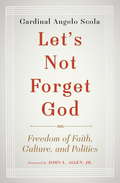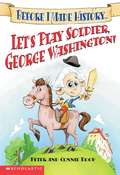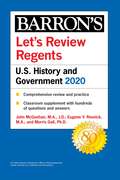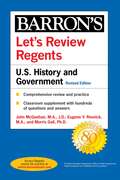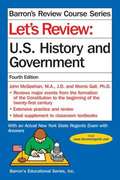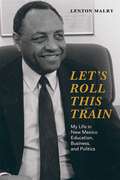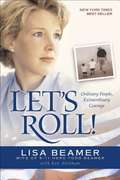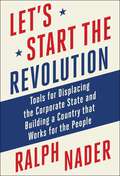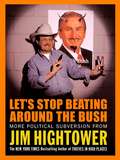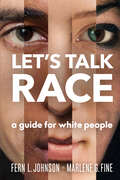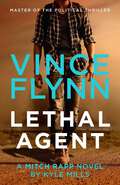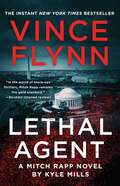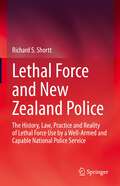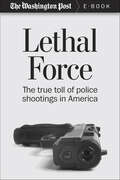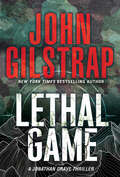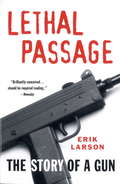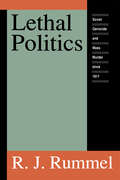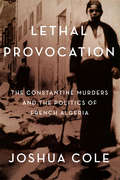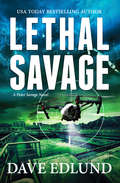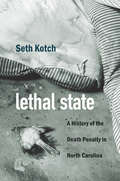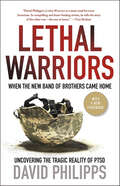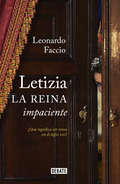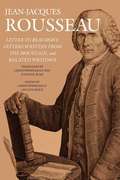- Table View
- List View
Let's Not Forget God
by John L. Allen Cardinal Angelo ScolaBorn out of a speech celebrating the 1,700th anniversary of the Edict of Milan, in which emperors Constantine I and Licinius granted Christians legal rights, this book by Cardinal Angelo Scola gives attention to the crisis of religious freedom in the twenty-first century. Let's Not Forget God outlines how Christianity has been at the center of creating a pluralistic society, from the Roman Empire in 313 to the American Revolution in 1776. This bold vision of freedom brings religion into the realm of public debate without allowing the state to banish or control it. "The question of religious freedom,closely connected to that of freedom of conscience," writes Cardinal Scola, "is revealing itself today to be crucial not only to the development of Western societies but also to the peaceful evolution of their relationships with Asia, Africa, and Latin America." Let's Not Forget God is both a portrait of the history of religious freedom and a testament to its potential for spreading peace.From the Hardcover edition.
Let's Play Soldier, George Washington! (Before I Made History)
by Peter Roop Connie RoopWhat you might not know is that: General Washington led our American army to victory in the Revolutionary War. President Washington was our first President. George Washington had no children of his own. George Washington fought a war so Americans could be free. We celebrate George Washington's birthday in February on Presidents' Day. But did you know George Washington really had two birthdays? George Washington's face is on every dollar bill.
Let's Review Regents: U.S. History and Government 2020 (Barron's Regents)
by Morris Gall Eugene V. Resnick M.A. John McGeehan M.A. J.D.Barron's Let's Review Regents: U.S. History and Government 2020 gives students the step-by-step review and practice they need to prepare for the Regents exam. This updated edition is an ideal companion to high school textbooks and covers all U.S. History and Government topics prescribed by the New York State Board of Regents. You’ll get an overview of American history in its totality, starting with the Colonial era and concluding with recent significant events. This edition includes: The latest New York State Regents U.S. History and Government Exam, Summaries of key topics with maps, charts, and illustrations, Review exercises consisting of questions with answers, A detailed chronology of major events in American history, Thumbnail biographies of notable Americans, A glossary of history terms and an extensive index. Looking for additional practice and review? Check out Barron&’s Regents U.S. History and Government Power Pack 2020 two-volume set, which includes Regents Exams and Answers: U.S. History and Government 2020 in addition to Let’s Review U.S. History and Government.
Let's Review Regents: U.S. History and Government Revised Edition (Barron's Regents NY)
by Eugene V. Resnick M.A. John McGeehan M.A. J.D. Morris Gall Ph.D.Barron's Let's Review Regents: U.S. History and Government gives students the step-by-step review and practice they need to prepare for the Regents exam. This updated edition is an ideal companion to high school textbooks and covers all U.S. History and Government topics prescribed by the New York State Board of Regents. You&’ll get an overview of American history in its totality, starting with the Colonial era and concluding with recent significant events. All Regents test dates for 2020 have been canceled. Currently the State Education Department of New York has released tentative test dates for the 2021 Regents. The dates are set for January 26-29, 2021, June 15-25, 2021, and August 12-13th. This edition includes:The latest New York State Regents U.S. History and Government ExamSummaries of key topics with maps, charts, and illustrationsReview exercises consisting of questions with answersA detailed chronology of major events in American historyThumbnail biographies of notable AmericansA glossary of history terms and an extensive indexLooking for additional practice and review? Check out Barron&’s Regents U.S. History and Government Power Pack two-volume set, which includes Regents Exams and Answers: U.S. History and Government in addition to Let&’s Review U.S. History and Government.
Let's Review: U. S. History and Government (4th edition)
by John Mcgeehan Morris GallThis supplementary classroom text reviews American history in its totality, starting with the Colonial era and concluding with events of the twenty-first century. The book presents summaries of hundreds of key topics, maps, charts, illustrations, review exercises, a 13-page chronology of major events in American history, thumbnail biographies of notable Americans, a glossary of terms, and an extensive index. Shaded page edges give students quick access to any one of six general study units: Constitutional Foundations, Industrialization, The Progressive Movement, Prosperity and Depression (1917-1940), The United States in an Age of Global Crisis, and A World in Uncertain times (1950-Present). Also presented is the latest New York State Regents Exam with answers. Designed primarily for use in New York State high schools, this book can be used virtually everywhere because it covers topics as they are taught in secondary schools throughout the country.
Let's Roll This Train: My Life in New Mexico Education, Business, and Politics
by Lenton MalryThis inspiring memoir chronicles Lenton Malry&’s journey from segregated Louisiana to a distinguished career in public service in New Mexico. Malry worked as a teacher on the Navajo Reservation, as a public school administrator in Albuquerque, and as a commissioner in Bernalillo County. He was also the first African American elected to the New Mexico state legislature and the first African American to earn a PhD in education from the University of New Mexico.
Let's Roll: Ordinary People, Extraordinary Courage
by Ken Abraham Lisa BeamerThe behind-the-scenes story of United Flight 93 hero Todd Beamer and his widow, Lisa--is so much more than a tribute. A message of character, courage, and undeniable faith in the face of horrifying tragedy, it encourages anyone who reads it to live.
Let's Split Logs, Abe Lincoln! (Before I Made History)
by Peter Roop Connie RoopWhat you might not have known about him: Abraham Lincoln had many nicknames during his life. One of Abraham Lincoln's nicknames was "Honest Abe." Do you know how he got this nickname? Young Abraham Lincoln lived in three states. Do you know which ones? All of his life Abe Lincoln liked to learn. Do you know how many years Abe was actually in school? Abe Lincoln liked to write, but his family was poor. Do you know what he wrote on instead of paper? Abraham Lincoln had a hero whom he admired. Abraham Lincoln ran in many elections. Do you know which one he was the most proud of? President Lincoln was our tallest president. He was the first president to grow a beard. Do you know who asked him to grow it? Abraham Lincoln died while he was President. Did you know he almost accidentally died twice when he was young?
Let's Start the Revolution: Tools for Displacing the Corporate State and Building a Country that Works for the People
by Ralph NaderIn his latest eye-opening exploration, political maverick Ralph Nader dissects the astonishing twists and turns of the 2020 presidential election, a race that left the nation on the edge of its seat. Although Joe Biden clinched victory with a substantial popular vote lead, Nader unveils the precarious nature of the outcome, where a mere 100,000 votes in key swing states could have catapulted Donald Trump back to the presidency. In Let's Start the Revolution Nader asks: How did the Democrats, despite winning the 2020 election, find themselves teetering on the edge of defeat? The answers, he finds, lie in the Democratic Party's gradual decline into decrepitude—a self-isolation from blue-collar America, an unhealthy fixation on corporate funding, and an alarming aversion to introspection. Nader argues that the Democrats' abandonment of their base and failure to address critical issues allowed the Republicans to solidify their hold on key states. Let's Start the Revolution exposes the insular nature of the Democratic Party apparatus, adept at fundraising but detached from the grassroots movements that truly define the political landscape. Nader argues that the focus on dollars over principles has eroded the authenticity of the Democratic Party's rhetoric on workers, consumers, and children. Drawing on historical parallels and real-life examples, Nader unearths the pitfalls of relying on political and media consultants who prioritize corporate interests over the needs of the people, isolating candidates from progressive citizen organizations and obstructing crucial, campaign-winning agendas. As Nader dissects the Democratic Party's stagnation, he offers a compelling narrative on its post-2010 decline, exploring the devastating impact of gerrymandering and the loss of over 1000 state legislative seats. The book highlights the party's inability to connect with voters, missing opportunities for meaningful engagement, and perpetuating a cycle of defeat. The Democrats have written off competing in half the country and have ceased to be a true national party. Let's Start the Revolution is not just a critique but a call to action. Nader advocates for a genuine relationship between the Democratic Party and the everyday lives of the people it seeks to represent. Based on his deep understanding of the necessities, anxieties, and dreams of millions of families, Nader charts a path forward—a path that prioritizes authenticity, community engagement, and a relentless pursuit of the common good. In a political landscape marred by a "divide and rule" polarization emanating from the power struggle between the major parties, this book serves as a vital roadmap for revitalizing democracy, empowering all citizens, and steering the Democratic Party away from cronyism and complacency. Ralph Nader's latest work is a rallying cry for those who believe in the power of the people to arouse the heart of American democracy.
Let's Stop Beating Around the Bush: More Political Subversion from Jim Hightower
by Jim HightowerAmerica in 2004 is color coded—and it’s not just a matter of red, white, and blue. The terror alert bounces from yellow to orange. The economy offers up a hundred shades of red ink. The environment is turning brown. National security is cloaked in gray shadows. And Jim Hightower covers it all with uncommon insight, political fearlessness, and laugh-out-loud humor. <P> America’s #1 populist gives us Let’s Stop Beating Around the Bush—a hard- hitting, fact-filled review of the real state of the union that you won’t get from the establishment media. With his daily radio commentaries and award-winning monthly newsletter, no one has chronicled the madness of King George the W, the wimpiness of corporate Democrats, and the aggressive avarice of Wall Street with the thoroughness and tenacity of Hightower. Now he brings that investigative punch into this wild and woolly book of fiery essays.<P> With his satirical "Six Perfectly Good Reasons to Re-elect George W. Bush;" his mix of damning indictments and uplifting stories; and side bars, cartoons, games, and puzzles, Hightower has done the impossible: He has created a subversive read that makes politics fun again.
Let's Talk Race: A Guide for White People
by Fern L. Johnson Marlene G. FineReal conversations about racism need to start nowLet's Talk Race confronts why white people struggle to talk about race, why we need to own this problem, and how we can learn to do the work ourselves and stop expecting Black people to do it for us.Written by two specialists in race relations and parents of two adopted African American sons, the book provides unique insights and practical guidance, richly illustrated with personal examples, anecdotes, research findings, and prompts for personal reflection and conversations about race.Coverage includes:Seeing the varied forms of racismHow we normalize and privilege whitenessEssential and often unknown elements of Black history that inform the presentRacial disparities in education, health, criminal justice, and wealthUnderstanding racially-linked cultural differencesHow to find conversational partners and create safe spaces for conversationsConversational do's and don'ts.Let's Talk Race is for all white people who want to face the challenges of talking about race and working towards justice and equity.
Let's re-Great Britain
by Al MurrayIn Let's re-Great Britain, Al Murray's Pub Landlord sets out his party's vision for the country, and explains how politics actually works.Citizens of Hope & Glory! It's time to bring common sense to the House of Commons.Parliament is a nest of slippery, poisonous vipers and only a bonkers, mental idiot would try to make sense of it. Yet in Let's re-Great Britain, Al Murray, the Pub Landlord, presents his guide to British politics and a vision for a Greater Britain.In it you'll learn and appreciate The Guv's views and policies on:- The jobless: Fix youth unemployment with a pyramid scheme (literally, build some pyramids)- Economics: Cut the deficit by borrowing more, growing a beard and leaving the country- Criminal Justice: Bring back hanging if only for the sake of the rope industry- Immigration: Electrify the English ChannelA plain, common-sense vision of an impossibly complicated (and, frankly, dull) subject, this will almost certainly be one day hailed as the new founding text of the nation - a Magna Carta 2.0 from the Landlord of Hope and Glory.
Lethal Agent (A Mitch Rapp Novel #18)
by Kyle Mills Vince FlynnAn unprecedented and terrifying bioterrorism plot threatens to kill millions in the midst of a divisive presidential election in this new thriller from the #1 New York Times bestselling Mitch Rapp series. A toxic presidential election is underway in an America already badly weakened by internal divisions. While politicians focus entirely on maintaining their own power and privilege, ISIS kidnaps a brilliant French microbiologist and forces him to begin manufacturing anthrax. Slickly produced videos chronicling his progress and threatening an imminent attack are posted to the Internet, intensifying the hysteria gripping the US. ISIS recruits a Mexican drug cartel to smuggle the bioweapon across the border, but it&’s really just a diversion. The terrorist organisation needs to keep Mitch Rapp and Irene Kennedy distracted long enough to weaponise a deadly virus that they stumbled upon in Yemen. If they succeed, they&’ll trigger a pandemic that could rewrite the world order. Rapp embarks on a mission to infiltrate the Mexican cartels and track down the ISIS leader who he failed to kill during their last confrontation. But with Washington&’s political elite increasingly lined up against him, he knows he&’ll be on his own.Praise for the Mitch Rapp series 'Sizzles with inside information and CIA secrets' Dan Brown 'A cracking, uncompromising yarn that literally takes no prisoners' The Times 'Mitch Rapp is a great character who always leaves the bad guys either very sorry for themselves or very dead' TheGuardian
Lethal Agent (A Mitch Rapp Novel #18)
by Kyle Mills Vince FlynnAn unprecedented and terrifying bioterrorism plot threatens to kill millions in the midst of a divisive presidential election in this &“gut punch of a tale that exploits our greatest fears&” (The Providence Journal) from the #1 New York Times bestselling Mitch Rapp series. A toxic presidential election is underway in an America already badly weakened by internal divisions. While politicians focus entirely on maintaining their own power, ISIS kidnaps a brilliant French microbiologist and forces him to begin manufacturing anthrax. Slickly produced videos chronicling his progress and threatening an imminent attack are posted to the internet, intensifying the hysteria gripping the United States. ISIS recruits a Mexican drug cartel to smuggle the bioweapon across the border, but it&’s really just a diversion. The terrorist organization needs to keep Mitch Rapp and Irene Kennedy distracted long enough to weaponize a deadly virus that they stumbled upon in Yemen. If they succeed, they&’ll trigger a pandemic that could rewrite the world order. Rapp embarks on a mission to infiltrate the Mexican cartels and track down the ISIS leader who he failed to kill during their last confrontation. But with Washington&’s political elite increasingly lined up against him, he knows he&’ll be on his own. Another stellar and white-knuckled thriller, Lethal Agent proves that &“Mitch Rapp is the hero we need, maybe now more than ever&” (The Real Book Spy).
Lethal Force and New Zealand Police: The History, Law, Practice and Reality of Lethal Force Use by a Well-Armed and Capable National Police Service
by Richard S. ShorttThis book challenges the notion that the New Zealand Police are one of only four global police services that does not have routinely armed officers, using arguments and facts drawn from 2000 to 2019, a period of important change for the organisation and its relationship with firearms, particularly following the outrages of the Christchurch mosques terrorist massacres in 2019, and the 2020 shooting death of a young police constable in Aotearoa New Zealand. This book provides a brief history of the Police from its beginnings to the present day with a specific focus on its relationship with firearms, which contextualize the law that justifies use of lethal force in a country that has abolished the death penalty. It examines police policies, procedures, training and structures governing deployment and use of firearms in Aotearoa New Zealand, and the independent oversight that now applies to fatal and non-fatal shootings by Police. Using 43 publicly released oversight agency reports and data directly related to police shootings, such as who is being shot, this book investigates how the police are using lethal force, who is being affected, and what this might mean for the service with regards to the operational deployment of firearms and the potential for use of lethal force within the community into the future.
Lethal Force: The True Toll of Police Shootings in America
by The Washington PostIn 2015, The Washington Post launched an unprecedented effort to account for every fatal shooting by an officer of the law. Their study has motivated the FBI to action, and changed the way we think of those who serve and protect. After a police officer shot and killed a black teenager in Ferguson, Missouri, the media began to pay greater attention to deadly interactions between black men and the law. But when reporters tried to get to the bottom of some basic questions—how often do police shoot people? Who are the victims? Are officers ever charged with crimes?—they came up blank. Police departments were not required to report these statistics to the FBI.The Washington Post set out to track every fatal shooting by an on-duty officer in 2015. Its database chronicled the shootings in real time, using news reports and other public sources. It compiled a trove of data, from the race of the person killed, whether the person was armed when killed, to whether the person was purported to have threatened the officer prior to being killed. The results found by the Post are shocking and haunting, from the sheer breadth of shootings by police in the U.S. to the stories of those killed. And its call to reform is being heeded. This groundbreaking book will radically alter how you view confrontation and accountability within the ranks, and offer a new perspective going forward.
Lethal Game: A Riveting Black Ops Thriller (A Jonathan Grave Thriller #14)
by John Gilstrap&“[Gilstrap&’s] greatest strength is the ability to blend breathtaking action with deep emotion regarding the characters.&” —Jeffery DeaverThe exhilarating new thriller from the New York Times and USA Today bestselling author takes readers on an action-packed thrill ride from the wilds of Montana to the streets of Mexico, as a sniper attack turns wilderness hunters into the hunted and Grave&’s enemies stalk him with a vengeance… Hostage rescue expert Jonathan Grave and his fellow special-ops veteran, Boxers, are hunting in Montana when shots ring out, and they realize they&’ve become the prey for assassins. In the crosshairs of unseen shooters, cut off from all communication, with the wind at a blood-freezing chill, the nightmare is just beginning. Because Jonathan and Boxers aren&’t the only ones under fire. Back in Fisherman&’s Cove, Virginia, Jonathan&’s Security Solutions team is fighting for their lives too. A vicious onslaught is clearing the way for a much bigger game by eliminating anyone in the way. If Jonathan and Boxers can make it out of the wilderness alive, the real war will begin. "When you pick up a John Gilstrap novel one thing is always true, you are going to be entertained at a high rate of speed." —Suspense Magazine &“Fans of adventure stories will find plenty to like.&” —Publishers Weekly
Lethal Passage: The Story of a Gun
by Erik LarsonThis devastating book illuminates America's gun culture -- its manufacturers, dealers, buffs, and propagandists -- but also offers concrete solutions to our national epidemic of death by firearm. It begins with an account of a crime that is by now almost commonplace: on December 16, 1988, sixteen-year-old Nicholas Elliot walked into his Virginia high school with a Cobray M-11/9 and several hundred rounds of ammunition tucked in his backpack. By day's end, he had killed one teacher and severely wounded another.In Lethal Passage Erik Larson shows us how a disturbed teenager was able to buy a weapon advertised as "the gun that made the eighties roar." The result is a book that can -- and should -- save lives, and that has already become an essential text in the gun-control debate.With a new afterword."Touches on all aspects of the gun issue in this country. Gives great voice to that feeling...that something real must be done." --San Diego Union-Tribune"One of the most readable anti-gun treatises in years." --Washington Post Book World
Lethal Politics: Soviet Genocide and Mass Murder Since 1917
by R. J. RummelWhile there are estimates of the number of people killed by Soviet authorities during particular episodes or campaigns, until now, no one has tried to calculate the complete human toll of Soviet genocides and mass murders since the revolution of 1917. Here, R. J. Rummel lists and analyzes hundreds of published estimates, presenting them in the historical context in which they occurred. His shocking conclusion is that, conservatively calculated, 61,911,000 people were systematically killed by the Communist regime from 1917 to 1987.Rummel divides the published estimates on which he bases his conclusions into eight historical periods, such as the Civil War, collectivization, and World War II. The estimates are further divided into agents of death, such as terrorism, deportations, and famine. Using statistical principles developed from more than 25 years of quantitative research on nations, he analyzes the estimates. In the collectivization period, for example, about 11,440,000 people were murdered. During World War II, while the Soviet Union had lost almost 20,000,000 in the war, the Party was killing even more of its citizens and foreigners-probably an additional 13,053,000. For each period, he defines, counts, and totals the sources of death. He shows that Soviet forced labor camps were the major engine of death, probably killing 39,464,000 prisoners overall.To give meaning and depth to these figures, Rummel compares them to the death toll from'major wars, world disasters, global genocide, deaths from cancer and other diseases, and the like. In these and other ways, Rummel goes well beyond the bare bones of statistical analysis and tries to provide understanding of this incredible toll of human lives. Why were these people killed? What was the political and social context? How can we understand it? These and other questions are addressed in a compelling historical narrative.This definitive book will be of interest to Soviet experts, those inte
Lethal Provocation: The Constantine Murders and the Politics of French Algeria
by Joshua ColePart murder mystery, part social history of political violence, Lethal Provocation is a forensic examination of the deadliest peacetime episode of anti-Jewish violence in modern French history. Joshua Cole reconstructs the 1934 riots in Constantine, Algeria, in which tensions between Muslims and Jews were aggravated by right-wing extremists, resulting in the deaths of twenty-eight people. Animating the unrest was Mohamed El Maadi, a soldier in the French army. Later a member of a notorious French nationalist group that threatened insurrection in the late 1930s, El Maadi became an enthusiastic supporter of France's Vichy regime in World War II, and finished his career in the German SS. Cole cracks the "cold case" of El Maadi's participation in the events, revealing both his presence at the scene and his motives in provoking violence at a moment when the French government was debating the rights of Muslims in Algeria. Local police and authorities came to know about the role of provocation in the unrest and killings and purposely hid the truth during the investigation that followed. Cole's sensitive history brings into high relief the cruelty of social relations in the decades before the war for Algerian independence.
Lethal Savage: A Peter Savage Novel (Peter Savage #6)
by Dave Edlund"I would follow Peter Savage into any firefight." -James Rollins, New York Times bestseller of The Demon CrownTwo men, one driven to the edge of sanity by heart-breaking losses, the other craving revenge, conspire to reshape America and bring her population to their knees.When young men on the Warm Springs Reservation in Central Oregon are stricken with an unidentified disease that leaves them sterile, Peter Savage is called to aid in the investigation.With the inquiry gaining momentum, Peter is kidnapped by hardened mercenaries. In the remote high desert of Oregon, Peter finds himself face to face with a demon from his past-an adversary who has seemingly risen from the grave.As the minutes count down to a biological holocaust, Peter presents the only chance to save an unwitting civilian population. With his trusted canine companion Diesel by his side, along with a former-assassin-turned-ally, Peter must gamble far more than his own life… and the odds have never been so long..Praise for Dave Edlund's Peter Savage Novels"I would follow Peter Savage into any firefight." -James Rollins,New York Times bestseller of The Demon Crown"Edlund is right at home with his bestselling brethren, Brad Thor and Brad Taylor." - Jon Land, USA Today bestselling author of the Caitlin Strong series"Required reading for any thriller aficionado" –Steve Berry, New York Times and #1 international bestselling author"Action on almost every page" -Foreword Reviews"Plenty of heart-racing action" -San Francisco Book ReviewRead the whole series!• Crossing Savage - Book 1• Relentless Savage - Book 2• Deadly Savage - Book 3• Hunting Savage - Book 4• Guarding Savage - Book 5• Lethal Savage - Book 6
Lethal State: A History of the Death Penalty in North Carolina (Justice, Power, and Politics)
by Seth KotchFor years, American states have tinkered with the machinery of death, seeking to align capital punishment with evolving social standards and public will. Against this backdrop, North Carolina had long stood out as a prolific executioner with harsh mandatory sentencing statutes. But as the state sought to remake its image as modern and business-progressive in the early twentieth century, the question of execution preoccupied lawmakers, reformers, and state boosters alike.In this book, Seth Kotch recounts the history of the death penalty in North Carolina from its colonial origins to the present. He tracks the attempts to reform and sanitize the administration of death in a state as dedicated to its image as it was to rigid racial hierarchies. Through this lens, Lethal State helps explain not only Americans' deep and growing uncertainty about the death penalty but also their commitment to it. Kotch argues that Jim Crow justice continued to reign in the guise of a modernizing, orderly state and offers essential insight into the relationship between race, violence, and power in North Carolina. The history of capital punishment in North Carolina, as in other states wrestling with similar issues, emerges as one of state-building through lethal punishment.
Lethal Warriors: When the New Band of Brothers Came Home
by David PhilippsPulitzer Prize finalist David Philipps brings to life the chilling story of how today's American heroes are slipping through the fingers of society—with multiple tours of duty and inadequate mental-health support creating a crisis of PTSD and a large-scale failure of veterans to reintegrate into society.Following the frightening narrative of the 506th Infantry Regiment—who had rebranded themselves as the Lethal Warriors after decades as the Band of Brothers—he reveals how the painful realities of war have multiplied in recent years, with tragic outcomes for America's soldiers, compounded by an indifferent government and a shrinking societal safety net.
Letizia. La reina impaciente: ¿Qué significa ser reina en el siglo XXI?
by Leonardo Faccio¿Qué significa ser reina en el siglo XXI? Este perfil biográfico presenta por primera vez a Letizia Ortiz con todas sus fortalezas y contradicciones: su búsqueda incesante de la perfección, el descontento perpetuo con sí misma, sus ansias de controlarlo todo, pero también su ímpetu, audacia y rebeldía. La vida de la mujer que en menos de diez años pasó de un bloque de apartamentos en Oviedo a ser presentadora de televisión en Madrid y que acabó siendo princesa y reina de España. Tras cinco años y más de cien entrevistas, Leonardo Faccio radiografía la personalidad de la reina, una periodista que renuncia a su profesión pero no a sus batallas personales para ser parte de una monarquía en crisis que quiere modernizarse para sobrevivir.
Letter To Beaumont, Letters Written From The Mountain, And Related Writings
by Jean-Jacques Rousseau Christopher Kelly Eve Grace Judith R. BushPublished between 1762 and 1765, these writings are the last works Rousseau wrote for publication during his lifetime. Responding in each to the censorship and burning of Emile and Social Contract, Rousseau airs his views on censorship, religion, and the relation between theory and practice in politics. <p><p> The Letter to Beaumont is a response to a Pastoral Letter by Christophe de Beaumont, Archbishop of Paris (also included in this volume), which attacks the religious teaching in Emile. Rousseau's response concerns the general theme of the relation between reason and revelation and contains his most explicit and boldest discussions of the Christian doctrines of creation, miracles, and original sin. <p> In Letters Written from the Mountain, a response to the political crisis in Rousseau's homeland of Geneva caused by a dispute over the burning of his works, Rousseau extends his discussion of Christianity and shows how the political principles of the Social Contract can be applied to a concrete constitutional crisis. One of his most important statements on the relation between political philosophy and political practice, it is accompanied by a fragmentary "History of the Government of Geneva." <p> Finally, "Vision of Peter of the Mountain, Called the Seer" is a humorous response to a resident of Motiers who had been inciting attacks on Rousseau during his exile there. Taking the form of a scriptural account of a vision, it is one of the rare examples of satire from Rousseau's pen and the only work he published anonymously after his decision in the early 1750s to put his name on all his published works. Within its satirical form, the "Vision" contains Rousseau's last public reflections on religious issues. <p> Neither the Letter to Beaumont nor the Letters Written from the Mountain has been translated into English since defective translations that appeared shortly after their appearance in French. These are the first translations of both the "History" and the "Vision."
